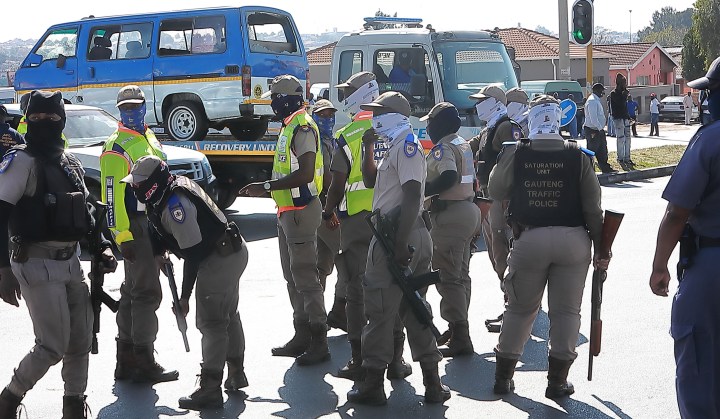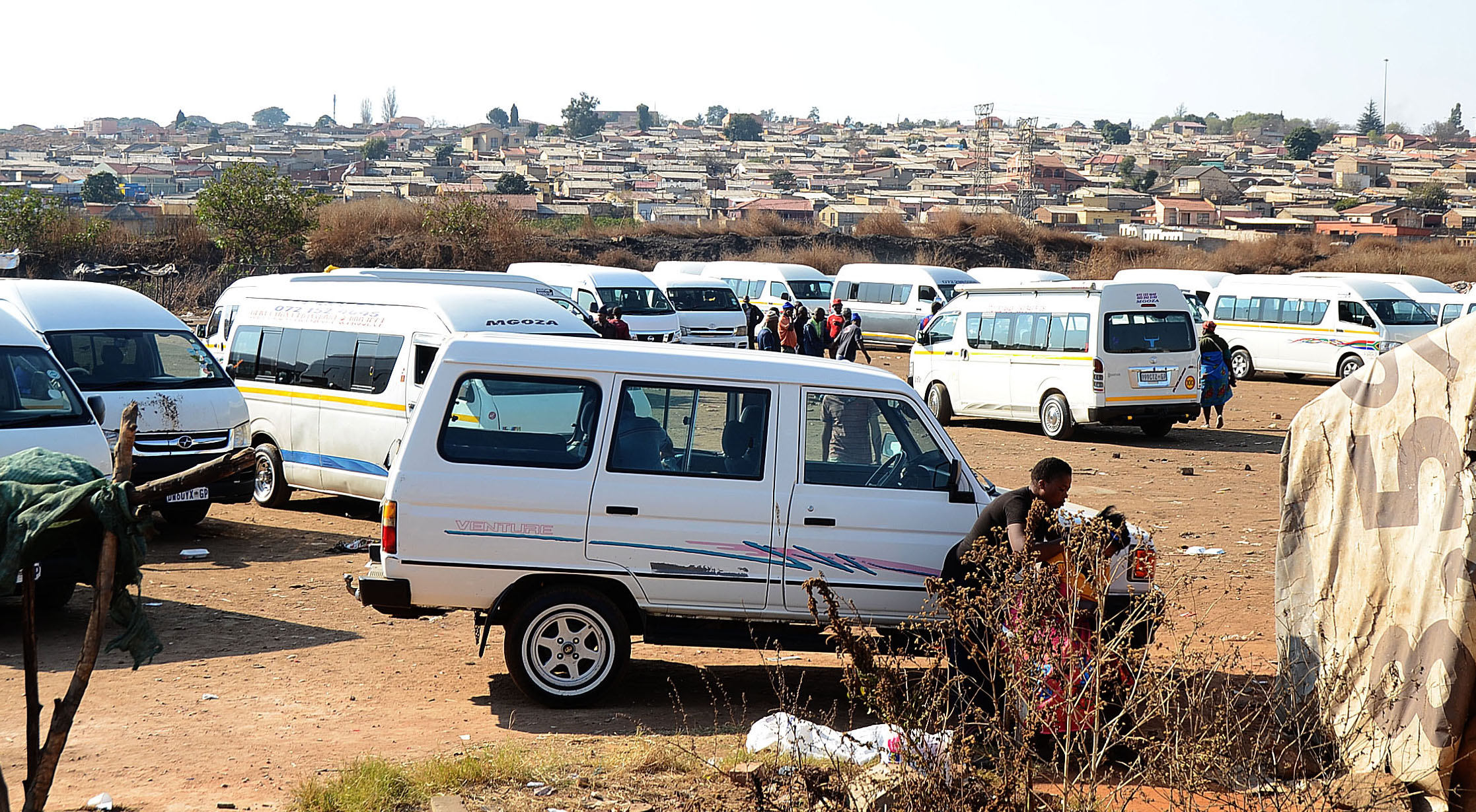MINI-BUS TAXI STRIFE
Drastic measures touted for insoluble Gauteng taxi war while commuters bear the brunt

Following more than a decade of deadly taxi violence in Gauteng, the provincial Department of Transport has resolved to suspend operating licenses linked to feuding operators, leaving commuters in a tight spot.
According to the provincial Department of Transport, MEC Kedibone Diale-Tlabela is currently in the process of publishing a notice on some taxi operating licenses.
“The MEC is intending on publishing in the government gazette notice to institute Extra Ordinary Measures as empowered by the National Land Transport Act 05 of 2009 section 91 to ultimately suspend the affected taxi association’s Operating Licences,” spokesperson for MEC Diale-Tlabela, Lesiba Mpya told Daily Maverick on Tuesday.
In accordance with the National Land Transport Act, the MEC must allow representations made by the affected parties and upon those submissions, she will determine the duration of the suspension of operating licenses.
The decision to suspend the licenses was taken following the recent resurgence of violence between warring associations Witwatersrand Taxi Association (Wata) and Nancefield Dube-West Taxi Association (Nanduwe).
“The notice of instituting Extra Ordinary Measures published in the provincial gazette relates and in this case to Wata and Nanduwe only,” said Mpya.
Disputed routes
The cause of most of the deadly violence is almost always fights over routes and encroachment.
The disputed routes include:
- Makhetha Stores, also known as Makhetha shops in White City, Soweto;
- Mthethwa stores, known as Mthethwa shops;
- Sizwe stores in Mofolo;
- Mncube Street in Dube;
- Makhetha Garage in Orlando West; and
- Khumalo Street in Orlando West.
The violence within the sector is not limited to these routes, as clashes also often flare up when other taxi operators encroach.
Consultation
One of the problems Daily Maverick has identified over the years is that there is little to no consultation at all with the taxi sector during the granting of new licenses to operate on established routes. While there might be no law that rules over this, it often leads to deadly conflict.
“They don’t consult us at all. If for instance, we are talking about operating a certain route, you should be consulted that there is someone who wants to also operate in that route, as an operator what do you say,” Hamilton Miya, spokesperson for Wata said.
This, it would seem, was the reason behind a flare-up of taxi violence in Ekurhuleni about three weeks ago. The taxi industry accused the city of Ekurhuleni of giving contracts to bus companies that operate on routes established by taxi operators.
The ensuing violence is believed to be the cause of the deaths of two men in Ekurhuleni. Police at the time said the deaths were suspected to be associated with the taxi violence.
Read more in Daily Maverick: Two killed as taxi violence resurges in Ekurhuleni, with strike action hobbling commuter services
“We just see people in possession of permits and wanting to operate,” said Miya.
Impounding of taxis
In an effort to enforce the law in the taxi sector and curb violence, last week saw the impounding of dozens of taxis by the provincial Department of Transport, together with law enforcement and the Road Traffic Management Corporation (RMTC). There were 47 taxis impounded in total — 26 belonging to Wata and 21 belonging to Nanduwe.
Miya disagreed with the department’s decision to impound taxis without operating licenses and blamed the department for this.
“Some vehicles do not have operating licenses because of the department’s own backlog,” he said.
The impounding of the mini-bus taxis last week led to a strike on Monday 8 April when Wata withdrew taxi services.
“We took a decision to halt our services, because either way, we were not working, our vehicles were being impounded,” Miya said.
Conflict
The conflict between Nanduwe and Wata dates as far back as 2013, with conflict over routes at the core of the deadly violence.
The conflict has resulted in hundreds of recorded deaths which remain unresolved, according to evidence heard at the Taxi Violence Commission in Emoyeni in Parktown in 2019. The commission heard that the 500 taxi-related murders remained unresolved.
It’s not clear how many Wata members have died in the violence, but the provincial department’s Mpya said, “There are confirmed reports by Wata alone that since the conflict over 74 fatalities are on record to have affected them.”
When asked what the department was doing to curb/ end the violence, Mpya responded:
“We have put in place conflict resolution mechanisms that include engagements among the parties involved, their mother body Santaco (the South African National Taxi Council) and GNTA (Gauteng National Taxi Alliance) including government led by the MEC, and applying the law at the MEC’s disposal that aims at preserving life and quelling any further potential acts of violence, intimidation, instability and unrest.”
“What we know is that the Department of Transport, or the employees of the Department of Transport gave/ sold our routes to other taxi operators. Now that association which was given our routes is bothering us,” Wata’s Hamilton Miya said on Tuesday.
Miya said the court had intervened and granted an order preventing the other association from encroaching on Wata’s allocated routes.
“The problem is corruption at the department and that the Department of Transport failed to implement the court order,” said Miya.
“Perhaps it will be best if we spoke to the Premier,” added Miya.
Unsatisfied by the provincial Department of Transport’s reaction to the impasse thus far, on Tuesday Wata members marched to Johannesburg to meet Gauteng Premier Lesufi and deliver their list of grievances. Lesufi was not in his office but another official received the list on his behalf.

Witwatersrand African Taxi Association drivers gather after Gauteng transport MEC Ismail Vadi announced his decision to ban disputed routes and taxi ranks on 12 July, 2017 in Soweto, South Africa. Wata remained defiant, saying it would transport commuters at all costs, slamming Vadi’s decision. (Photo: Gallo Images / Sowetan / Mduduzi Ndzingi)
Bearing the brunt
Commuters who bring in the money for the taxi sector are the ones who always bear the brunt of the conflict and resulting unannounced disruptions.
On both Monday and Tuesday, commuters were told to seek alternative transport. Gauteng transport MEC Diale-Tlabela also had the same advice for commuters on Tuesday, as the strike over the impoundments continued.
“I am duty bound to ensure that public transport is safe and that the community is not forced to live under a stranglehold of violence. Public transport is there to make it easy for the commuting public to travel from home to work and back safely,” Diale-Tlabela said.
Previous Gauteng MECs had closed the affected taxi ranks and routes for at least three months when violence in the taxi sector flared up. While Miya did not say if this was a success, previous results showed that violence would either worsen or temporarily calm down.
In 2020, the North Gauteng High Court confirmed an agreement between Gauteng’s major taxi associations, GNTA and Santaco, Gauteng, granting the MEC powers to dissolve taxi associations affected in taxi violence.
To maintain law and order in the affected areas in Soweto, a joint operation headed by Gauteng Department of Community Safety and Road Traffic Management Corporation officers has been deployed.
Nanduwe
Much like their long-standing foes, Nanduwe is blaming the government for the conflict, in that the provincial government allows Wata to operate in their route territory.
Spokesperson for Nanduwe Joseph Ngcobo said he could not say how many Nanduwe taxis have been impounded by the government as of Wednesday but he confirmed that a total of 47 taxis were impounded when he last checked.
Ngcobo blamed the government, saying it does not care about the well-being of the taxi-commuting public.
“The government takes our vehicles, we don’t know why, they say its permits. Now people are struggling when they have to go to work in the morning,” said Ngcobo.
“The government must go to the heart of the conflict. We admit there are problems but impounding our vehicles is not the solution,” he said.
“We load at the disputed points, but Wata leave their points and want to use our loading points. The government is the one perpetrating the violence. We don’t look at each other because of the government,” said Ngcobo.
Solution
While the provincial department has admitted to lapses in the system, it says improvements are in the pipeline.
“There are instances of lapses in the system that affect the efficiency and productivity of PRE (provincial regulatory entity), yes we do concede it factors into part of disputes, we have since instituted change of management in the HR, DC processes against officials who transgress and we are monitoring improvements,” said Mpya.
As part of developing a long-term safety strategy in the sector, the provincial government says it is also:
- developing new automated and digitised end-to-end application processes (PRE) specifically for operating licences in order to modernise the system;
- redesign infrastructure floor flow in all front-line centres; and
- review of current Operating Licence adjudicators.
Wata’s Miya was not as optimistic.
“There will be no solution to this because all incoming MECs are initiated into the rot within the department.” DM

















 Become an Insider
Become an Insider
Same problem in all the Metros
The anc is going to antogonise a lot of its voters? I think not. This is electioneering promises and promises and politicians are unreliable.
Thanks to MEC for intervening